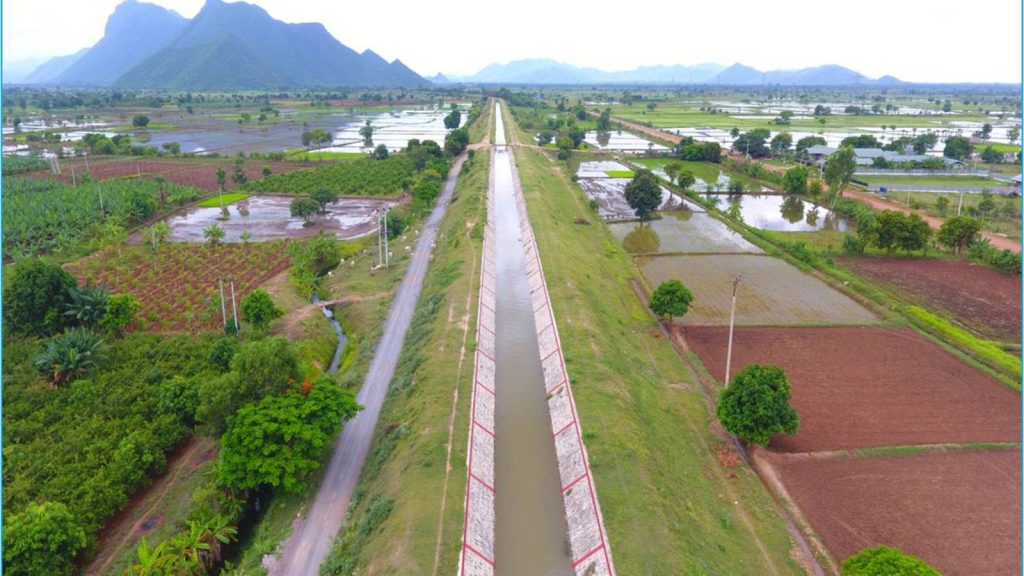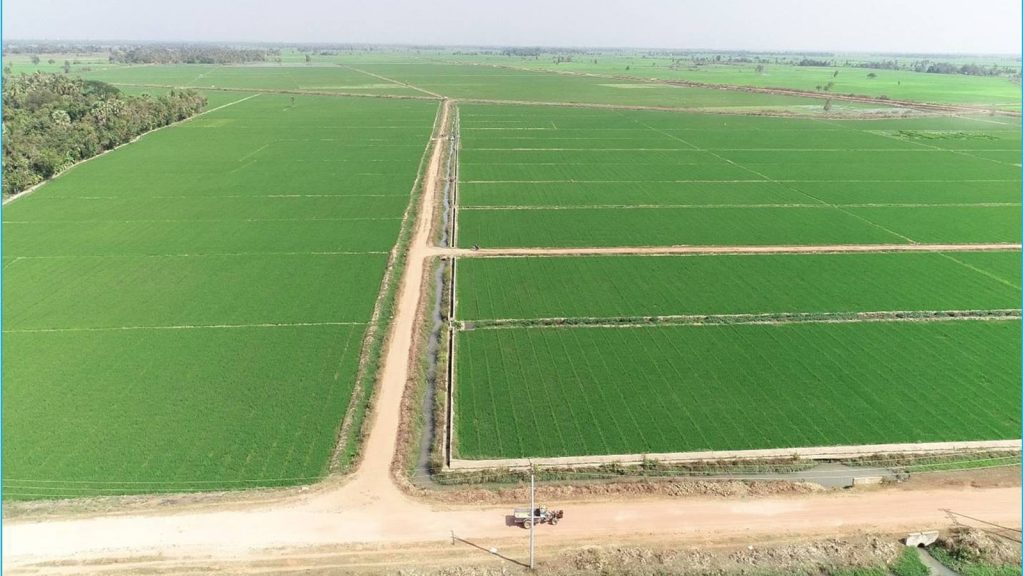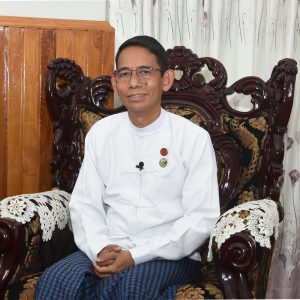By Thura Zaw,

Seventy per cent of the total population of Myanmar are farmers who live in rural areas. As such, the Ministry of Agriculture, Livestock and Irrigation (MoALI) amended policies to aid in the development of the agricultural sector and accomplish future objectives that will encompass the entire nation.
The following is an interview with Union Minister Dr. Aung Thu for MoALI on what his ministry had to do in their third year during the civilian government administration in order to reach their goal of raising agricultural development by 2.4%.
Q: Please tell us about the Agricultural Development Strategy (ADS) and Investment Plan.
A: The ADS and Investment Plan (2018-2019 to 2022-2023) was drafted with technical assistance from Asian Development Bank (ADB), Food and Agriculture Organization (FAO), and the Agriculture and Rural Development Sector Coordination Groups – ARDSCG.
The plan was made in line with the second short-term 5-year agricultural policies and tasks (2016), the National Economic Policy (2016), the Framework for Economic Reforms, national-level objectives for future all-round development, the Investment Law, and the National Export Strategy. So, I’m sure it will greatly support Myanmar’s economic development.
Q: What does the Department of Agriculture do for developing the agricultural sector?
A: The department carries out duties relating to food security, food safety, increasing the income of cultivators, ensuring high-quality products, and expanding the plantation of crops that can compete in both domestic and foreign markets.
Increased activities
This year, 7,137 acres of rice were planted and yielded 5805620 baskets of paddy. In relation to Good Agricultural Practices (GAP), they managed to advertise 15 different crops and this year they will open training courses and build capacity. As GAP priority land, they planted 1,558 acres of rainy season peanuts, 325 acres of rainy season sesame, 325 acres of winter peanuts, 65 acres of winter sesame and 83 acres of winter sunflowers.
The MoALI gave 1,538 GAP training classes, 1,383 seed production classes, 1,075 seed protection technology classes, 1,383 other technical classes, and conducted 26,280 cultivator discussions.
Expanded tasks
The ministry has issued 253 GAP certificates as of February and successfully developed one village per township as a role model using advanced technologies. The Vegetables and Fruits Research and Development Centre announced the Myanmar organic standards on 26 January 2019 and organized a horticultural fair. The Fertilizer Committee issued 1,197 registrations.
Q: Could you tell us what is being done concerning the right to own land?
A: As of now, we have issued Form-7 to 6,028,090 farmers for a combined land area of 25,206,274 acres. We issued Form-7 for 246,309 acres belonging to 59,548 farmers this year. Over the three years, we issued 967,101 Form-7 to 215,190 farmers.
We submitted the Bill to amend the 2012 Farmland Law to the Pyidaungsu Hluttaw. The Bill to amend the 2012 Vacant, Fallow and Virgin Land with Pyidaungsu Hluttaw Law No. 24 and we are working to amend its related bylaw.
Q: What assistance has been provided for farmers to receive irrigation?
A: The Department of Irrigation and Water Utilization Management facilitated irrigation from dam water for 1.392 million acres of summer crops and other crops and for 1.23 million acres of monsoon crops in 2017-2018. In this summer, they have provided dam water to 1.41 million acres of summer crops and other crops.
We will complete the water system and irrigation channels from South Nawin, North Nawin, We Gyi, and Taung Nyo dams in eastern Bago Region within this year. This will provide enough irrigation to 216,285 acres of farmlands.
Q: What did you implement to protect against floods?
A: We conducted 493 sluice, drainage and overflow drain projects in the 2018-2019 fiscal year, which has effectively protected 329,000 acres of farmland.
Q: What has the Agricultural Mechanization Department done so far?
A: The Constitution says the State must help in the transition from traditional agriculture and farming to an industrialized one by providing the technology, investment, machinery and raw materials to the best that it can. The Agricultural Mechanization Department is leading implementation on that.
Q: Could you explain what tasks the ministry is taking to upgrade farmlands.
A: This year, we upgraded 1,240 acres of farmland and established 388 acres of highland farms. That makes the total number over three years come up to 17,006 acres for upgrades and 3,426 acres for highland farms.
Floods this year destroyed plantations in Magway, Sagaing, Bago and Taninthayi regions and Kayin State. We tilled 51,020 acres of farmland to ensure farmers can plant the crops in time.
Q: What has the ministry been doing to produce high quality crops?
A: We have conducted research into breeding new species of crops that can produce the best results in the region where they will be planted. So far, we have produced 8 new species of rice and a specie each from maize, sunflower, peanut, pigeon peas, wheat and sugar cane.
We have now produced new species that will increase crop production and raise the income of farmers and is suitable for their region. We were able to increase the income of farmers, which is a major accomplishment. We upgraded the Zalat Agricultural Research Garden in Sagaing Region into a regional-level advanced research garden this year.
We held 76 farmer education seminars, technical courses, and observation and practical fairs. The farmer channel broadcasts agricultural news, questions and answers, documentaries, and 70 short series.
Q: Tell us about the Cooperative Department.
A: Cooperatives are businesses based on the people. Every member needs to know the requirements for their collective business, society and culture. They need to know the objectives themselves. Cooperatives will guide the people through a democratic procedure for equality.
Q: What has the Cooperative Department done in the three-year period?
A: There are now 40,518 cooperatives as 654 new ones were established in the three-year period. We strive for the emergence of high-quality departments as opposed to increase quantity. It’s not easy but hopeful to reach our goal within a set period.
There are 54 cooperatives in 119 townships that provide farm assistance services in addition to 140 other services. There are 166 cooperatives that provide seeds and provided K2,673.585 million in loans for 12,313 acres for seed production. They have also provided K26,625.001 million in loans to upgrade 87,002.8 acres in 168 townships.
Q: What has the Small-Scale Industries Department accomplished?
A: Their main duty is to help develop small scale industries, weaving businesses, traditional crafts and artisans and vocational businesses. They do this by spreading technology and skills where necessary.We have conducted 366 short-term vocational courses from 2018 to April 2019 and 1,145 courses in the three-year period. This has allowed the people to set up their own businesses, increase their income and create more job opportunities.
We have registered 6,889 small-scale industries in the three-year period and conducted chemical tests on products 9,257 times.
We have organized the Small-Scale Industries Product Fair, Myanmar Lacquer Fair, Traditional 10 Artisan Skills Product Fair, and fundraising events eight times in the states and regions. We have also expanded microfinance services to eight townships.

Q: What have you accomplished in the livestock sector?
A: The Livestock Breeding & Veterinary Department collects data on the number of livestock and issued an evaluated list on 10 January this year.
The department checks and issues health approval certificates for exporting livestock and cooperates with the Ministry of Commerce to implement good livestock breeding practices and finding new markets. This has generated US$539.266 million.
Q: What has the Department of Fisheries accomplished?
A: The department accompanied the research vessel Dr. Fridjog Nansen to discover breeding spots, spawning points and the appearance of microplastics in the flesh of fish.
Export of fishery products from April 2018 to February 2019 has generated US$649.245 million. We have cooperated with the Ministry of Education to open classes that teach about the fishing industry and include practical courses in Yangon University. Furthermore, we have completed building the necessary infrastructure to open the Twantay Marine Institute in Twantay Fishery Department, Yangon Region.
Q: Could you tell us what the Department of Rural Development has achieved?
A: We cooperated with UNICEF to provide access to clean drinking water in rural areas. We drew a programme for rural water supply and investment and conducted 1,051 water access projects in 989 villages. This has benefitted 708,000 people. We will continue about 2,209 water access projects in the 2018-2019 fiscal year.
Q: Do you have anything else you wish to say to our readers?
A: We will continue to work in line with the components of the Agriculture Development Strategy which include increasing the capacity for administration and skills, raising production and increasing income of farmers, and promoting competitive skills.
We will continue to work amongst our staff and with other relevant individuals and organizations through perseverance, determination, unity, innovation and good communication as we head towards the future together with all the citizens of Myanmar. (Translated by Pen Dali)



